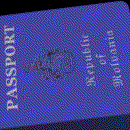Government statistics suggest multiculturalism is on the rise, but social organizations for mixed-race Japanese say 'hafus' still face challenges
By Tracy Slater 1 December, 2010
Japan, which closed its borders from 1639 to 1854 and later colonized its neighbors, has an uneasy history with foreigners, national identity, and multiculturalism.
Yet government statistics and grassroots organizations say multiculturalism in the famously insular country is now on the rise.
Teamwork at the Mixed Roots Expression Workshop at Takatori Community Centre in Kaiun-cho, Nagata-ku.
Japan: The new melting pot?
Japan's national government recently announced it is turning to travelers in a foreigner-friendly mission to boost diversity -- at least in tourist spots -- by paying them to provide feedback on how to increase accessibility for non-Japanese speakers.
David Askew, associate professor of law at Kyoto?fs Ritsumeikan University, identifies more profound changes.
In 1965, a mere 1 in 250 of all marriages in Japan were international, he notes. By 2004, the number had climbed to 1 in 15 across the nation and 1 in 10 in Tokyo.
According to Tokyo's Metropolitan Government, by 2005, foreign residents in the city numbered 248,363, up from 159,073 in 1990.
Read more: Will there ever be a rainbow Japan? | CNNGo.com
| Hot Topics | |
|---|---|
Multiculturalism on the rise?
46 posts
• Page 1 of 2 • 1, 2
Multiculturalism on the rise?
Will there ever be a rainbow Japan?
-

Ganma - Maezumo
- Posts: 741
- Joined: Wed Sep 09, 2009 6:48 pm
I Hate This!
You know, I really want to write something academic here, but I know you guyz wouldn't be able to handle it, so here's the dumb down version:
1) I hate multiculturalism because when cultures mix a part of the predominant culture eventually dies, especially with all the mixing. ( long term affect)
2) What Japan has now today in terms of cultural and racial homogeneity is something Hitler would've envied. I use Hitler because he was a living historical figure that should never be forgotten, and neither should the circumstances leading up to his rise to power. The reason being, in a broader sense, is because what he strove to achieve along with Mussolini is a type of cultural homogeneity within their societies. Most governments, even today, naturally gravitate towards a strong cultural solidarity group that's more closely related to the predominant race, than to minority groups. In North America we scream equality and multi this and multi that, but even with a black president, whites are still the predominant culture/race and everybody all over the world knows this, which is why Obama can never restore America's credibility in his own skin.
In other words, only minorities and little people scream multi-culturalism at the detriment of society. Rich people never scream multiculturalism, and never do purist and cultural imperialist, either. What Japan has is incredibly beautiful and should not be changed cause of a few thousand whore Japanese wives who want to mate outside of their race.
1) I hate multiculturalism because when cultures mix a part of the predominant culture eventually dies, especially with all the mixing. ( long term affect)
2) What Japan has now today in terms of cultural and racial homogeneity is something Hitler would've envied. I use Hitler because he was a living historical figure that should never be forgotten, and neither should the circumstances leading up to his rise to power. The reason being, in a broader sense, is because what he strove to achieve along with Mussolini is a type of cultural homogeneity within their societies. Most governments, even today, naturally gravitate towards a strong cultural solidarity group that's more closely related to the predominant race, than to minority groups. In North America we scream equality and multi this and multi that, but even with a black president, whites are still the predominant culture/race and everybody all over the world knows this, which is why Obama can never restore America's credibility in his own skin.
In other words, only minorities and little people scream multi-culturalism at the detriment of society. Rich people never scream multiculturalism, and never do purist and cultural imperialist, either. What Japan has is incredibly beautiful and should not be changed cause of a few thousand whore Japanese wives who want to mate outside of their race.
-

McTojo - Maezumo
- Posts: 860
- Joined: Mon Oct 13, 2008 3:46 am
McTurd wrote:What Japan has is incredibly beautiful and should not be changed cause of a few thousand whore Japanese wives who want to mate outside of their race.
Your monumental stupidity is nothing short of astounding.
You have got to be just about the most ignorant piece of excrement and vitriol spewing, Nazi-loving, vile excuse for a troll that this board has seen (in recent memory anyway).
You must have been burned REAL bad in the past to keep it up like this...
-

BigInJapan - Maezumo
- Posts: 1140
- Joined: Thu May 14, 2009 6:45 pm
- Location: Down south (but from the Great White North)
McTojo wrote:Whaargarbl!
So I suppose you would have been satisfied with Jim Crow legislation, segregation, apartheid and slavery?
I will not abide ignorant intolerance just for the sake of getting along.
-

American Oyaji - Posts: 6540
- Images: 0
- Joined: Sun Oct 20, 2002 9:20 pm
- Location: The Evidence of Things Unseen
Nice.
BigInJapan wrote:Your monumental stupidity is nothing short of astounding.
You have got to be just about the most ignorant piece of excrement and vitriol spewing, Nazi-loving, vile excuse for a troll that this board has seen (in recent memory anyway).
You must have been burned REAL bad in the past to keep it up like this...
I understand that Japanese men ruin it for the country, too. Yes. Taking Filipino wives, and every other color of the rainbow 'cause they can't make it with their own women is truly absurd. On one of my blog posts I wrote about a sake tasting group in Akarenga. One of the guys there was married to a Filipino and he wanted me to meet her and her friends and hang out, along with his other associates. I respectfully decline and explained that for me it's Japanese only. I couldn't stomach drinking with other nationalities on Japanese soil, that's probably why you never see any pics of me with other Westerners and Asians.
-

McTojo - Maezumo
- Posts: 860
- Joined: Mon Oct 13, 2008 3:46 am
hmmm
American Oyaji wrote:So I suppose you would have been satisfied with Jim Crow legislation, segregation, apartheid and slavery?
Segregated schools and communities have traditionally been defined as being disadvantageous for children. But this isn't true, unless you are MLK and you believe that separate is not equal BS.
Jews, for example, have their own schools and communities, which serve to better enhance their children's education and sense community. They don't care about equal. Good Black and segregated schools would've served the community better for blacks had their been adequate funding, which could've better nurtured young black minds. Segregation can work, in other words. It has worked in the past with other groups. Instead, you still a black kids in an all white school and then cross you fingers and hope that somehow the little black kid can assimilate. A part of that child would have to die, along with its identity in order to be accepted.
Apartheid made it possible for Africa to modernize and to receive an English education. Was it a good thing? TransAtlantic slave trade, made it possible to 30 million Africans to live in America. Who am I to say it was the worst of all evils when slavery still exists on the continent of Africa today? Africans and Muslims trade slaves too.
Jim Crow brought about solidarity amongst Blacks in the South. After Reagan, black forgot about being Black and started looking out for themselves and getting jerry curls. Who am I to say Jim Crow was wrong? A black knew he was black. And just for your information, there were successful and well off Blacks even during Jim Crow.
-

McTojo - Maezumo
- Posts: 860
- Joined: Mon Oct 13, 2008 3:46 am
McTojo wrote:You know, I really want to write something academic here, but I know you guyz wouldn't be able to handle it, so here's the dumb down version:
1) I hate multiculturalism because when cultures mix a part of the predominant culture eventually dies, especially with all the mixing. ( long term affect)
2) What Japan has now today in terms of cultural and racial homogeneity is something Hitler would've envied. I use Hitler because he was a living historical figure that should never be forgotten, and neither should the circumstances leading up to his rise to power. The reason being, in a broader sense, is because what he strove to achieve along with Mussolini is a type of cultural homogeneity within their societies. Most governments, even today, naturally gravitate towards a strong cultural solidarity group that's more closely related to the predominant race, than to minority groups. In North America we scream equality and multi this and multi that, but even with a black president, whites are still the predominant culture/race and everybody all over the world knows this, which is why Obama can never restore America's credibility in his own skin.
In other words, only minorities and little people scream multi-culturalism at the detriment of society. Rich people never scream multiculturalism, and never do purist and cultural imperialist, either. What Japan has is incredibly beautiful and should not be changed cause of a few thousand whore Japanese wives who want to mate outside of their race.
Why don't you write something academic about the source of the "homogenous" Japanese DNA? You can site several of the many studies that show their DNA origin coming from all over the Asia continent and Eastern Europe through mitochondrial testing. But, that would go against your script performance you are required to use while acting as a token for the Uioku. They might not like that and could possible want to remove your token nuts for mentioning that their DNA did not originate in Yamato no kuni. It's a bit costly yet, but several companies here in J-land do offer to trace your DNA to show your area of ancestral origin....
"There are those that learn by reading. Then a few who learn by observation. The rest have to piss on an electric fence and find out for themselves!"- Will Rogers

-

Greji - Posts: 14357
- Joined: Fri Jun 25, 2004 3:00 pm
- Location: Yoshiwara
On a biological level, inter-breeding is desired in order to get certain gene advantages from one race to the other.
So all you nazi-eugenics freaks are actually fighting against nature.
So all you nazi-eugenics freaks are actually fighting against nature.
------------------------------------------------------
The wonderful thing about a dancing bear is not how well he dances, but that he dances at all.
The wonderful thing about a dancing bear is not how well he dances, but that he dances at all.
-

Neo-Rio - Maezumo
- Posts: 723
- Joined: Fri Feb 21, 2003 5:55 pm
- Location: Sobu line priority seat
DNA
Greji wrote:Why don't you write something academic about the source of the "homogenous" Japanese DNA? You can site several of the many studies that show their DNA origin coming from all over the Asia continent and Eastern Europe through mitochondrial testing. But, that would go against your script performance you are required to use while acting as a token for the Uioku. They might not like that and could possible want to remove your token nuts for mentioning that their DNA did not originate in Yamato no kuni. It's a bit costly yet, but several companies here in J-land do offer to trace your DNA to show your area of ancestral origin....
I don't deny the genetic contributions of other races and the vast cultural heritage that came from them. But I think you're missing my point. People/societies strive to create societies where there are more racial/cultural similarities, than not. Though Chinese and Japanese may share a common historical link linguistically, and cultururally, it doesn't mean that they embrace each just because of these similarities. The true ultimate paradigm in any society is a mono-cultural/mono-racial society and then redefine the elements that contributed to their society.
Japanese rap music is in no way "rap" as it's understood by Blacks. Yet this genre of musical expression owes an enormous debt Blacks. Japanese artist don't care about this fact, and neither to most people.
-

McTojo - Maezumo
- Posts: 860
- Joined: Mon Oct 13, 2008 3:46 am
Ignoring McTojo.
But does that opening piece actually say that 1 in 10 weddings in Tokyo is "international" (and 1 in 15 nationwide)? That can't possibly be true, can it?
But does that opening piece actually say that 1 in 10 weddings in Tokyo is "international" (and 1 in 15 nationwide)? That can't possibly be true, can it?
- maraboutslim
- Maezumo
- Posts: 993
- Joined: Wed Jun 18, 2003 10:26 am
Neo-Rio wrote:On a biological level, inter-breeding is desired in order to get certain gene advantages from one race to the other.
So all you nazi-eugenics freaks are actually fighting against nature.
Yup, and the statistics can only go up, not down. Once that gaijin DNA gets into your family tree, it doesn't leave and can show up as freaky characteristics like longer, straighter legs, wider eyes, the normal number of teeth, and (gasp!) sticky ear wax; even in your great grandchildren!
Some may even have no need to bleach their hair, a potential disaster for the hair dressing industry!
Remember that!
[font="Trebuchet MS"][SIZE="1"]Believe nothing, no matter where you read it or who has said it, not even if I have said it, unless it agrees with your own reason and your own common sense.
- Gautama the Buddha[/SIZE][/font]
- Gautama the Buddha[/SIZE][/font]
-

Dragonette - Maezumo
- Posts: 280
- Joined: Wed Dec 19, 2007 12:51 am
- Location: New York City
Im confused by Tojos post, did he forget that all humans originated in one place? And only started to take on other traits after they spread out around the world?
whats happening now is a convergence of all races. So really, back to what we once were. A single race.
We spread out, and now through modern technology are coming back together.
Yes, cultures have evolved and changed people. But that doesnt mean that when two people from two cultures marry and have children, that one culture has to be lost.
Quite the opposite. Most of those kids will learn about two very different cultures and that makes them more open minded and intelligent, and willing to explore the world they live in.
I want more people like that. Not narrow minded inbreeds who never explore outside of their culture and beliefs.
Tojo, what happens when we develop the ability to travel to other planets?
Should we not do that just to keep the human race racially pure?
Hey, if breeding with an alien chick means my kids will be faster, stronger, more intelligent, then show me the way to the nearest alien babes!
whats happening now is a convergence of all races. So really, back to what we once were. A single race.
We spread out, and now through modern technology are coming back together.
Yes, cultures have evolved and changed people. But that doesnt mean that when two people from two cultures marry and have children, that one culture has to be lost.
Quite the opposite. Most of those kids will learn about two very different cultures and that makes them more open minded and intelligent, and willing to explore the world they live in.
I want more people like that. Not narrow minded inbreeds who never explore outside of their culture and beliefs.
Tojo, what happens when we develop the ability to travel to other planets?
Should we not do that just to keep the human race racially pure?
Hey, if breeding with an alien chick means my kids will be faster, stronger, more intelligent, then show me the way to the nearest alien babes!
-

AML - Maezumo
- Posts: 194
- Joined: Wed Sep 08, 2010 11:40 am
AML wrote:Hey, if breeding with an alien chick means my kids will be faster, stronger, more intelligent, then show me the way to the nearest alien babes!
I wouldn't mind doing Spock.....
"There are those that learn by reading. Then a few who learn by observation. The rest have to piss on an electric fence and find out for themselves!"- Will Rogers

-

Greji - Posts: 14357
- Joined: Fri Jun 25, 2004 3:00 pm
- Location: Yoshiwara
Well, if you dont like mixing blood, you can be like the Mhongs and inbread for centuries to the point where you cant marry someone with your mother or father's last name because it would be your close cousin....
When someone of Japanese ancestry is born, they get the blue butt... which is the mark of the mongol or some shit like that. Japanese people are nothing more or less chinese...
China/Mongols went Korea, Korea then traveled and found Japan and the people that were already there basically came from china long before. Whoever says that "Japanese" are pure blood are just retards that dont know nada (i.e. McTojo and the typical Tanaka-san)
Mix blood people... dont be an inbreed.
When someone of Japanese ancestry is born, they get the blue butt... which is the mark of the mongol or some shit like that. Japanese people are nothing more or less chinese...
China/Mongols went Korea, Korea then traveled and found Japan and the people that were already there basically came from china long before. Whoever says that "Japanese" are pure blood are just retards that dont know nada (i.e. McTojo and the typical Tanaka-san)
Mix blood people... dont be an inbreed.
"I thought what I'd do was, I'd pretend I would pull out, but won't."
-

IparryU - Maezumo
- Posts: 4285
- Joined: Thu Jun 04, 2009 11:09 pm
- Location: Balls deep draining out
Greji wrote:I wouldn't mind doing Spock.....
You can do Spock if you like, I'll take T'Pol

I will not abide ignorant intolerance just for the sake of getting along.
-

American Oyaji - Posts: 6540
- Images: 0
- Joined: Sun Oct 20, 2002 9:20 pm
- Location: The Evidence of Things Unseen
McTojo wrote:1) I hate multiculturalism because when cultures mix a part of the predominant culture eventually dies, especially with all the mixing. ( long term affect)
-snip-
Thank the Lords (yes, still ever the polytheist am I...) that you didn't write something academic, since the word I believe you are looking for is "effect". After all, "affect" is a verb, ci?
-

6810 - Maezumo
- Posts: 376
- Joined: Tue Apr 05, 2005 7:09 pm
IparryU wrote:Well, if you dont like mixing blood, you can be like the Mhongs and inbread for centuries to the point where you cant marry someone with your mother or father's last name because it would be your close cousin....
When someone of Japanese ancestry is born, they get the blue butt... which is the mark of the mongol or some shit like that. Japanese people are nothing more or less chinese...
China/Mongols went Korea, Korea then traveled and found Japan and the people that were already there basically came from china long before. Whoever says that "Japanese" are pure blood are just retards that dont know nada (i.e. McTojo and the typical Tanaka-san)
Mix blood people... dont be an inbreed.
I'm all for mixing of the races. Especially when I'm using my dick to stir.
Faith is believing what you know ain't so. -- Mark Twain
-

Samurai_Jerk - Maezumo
- Posts: 14387
- Joined: Mon Feb 09, 2004 7:11 am
- Location: Tokyo
6810 wrote:Thank the Lords (yes, still ever the polytheist am I...) that you didn't write something academic, since the word I believe you are looking for is "effect". After all, "affect" is a verb, ci?
Thought you were referencing Battlestar Galactica. i.e. The Lords of Kobol
I will not abide ignorant intolerance just for the sake of getting along.
-

American Oyaji - Posts: 6540
- Images: 0
- Joined: Sun Oct 20, 2002 9:20 pm
- Location: The Evidence of Things Unseen
maraboutslim wrote:Ignoring McTojo.
But does that opening piece actually say that 1 in 10 weddings in Tokyo is "international" (and 1 in 15 nationwide)? That can't possibly be true, can it?
It's true, based on the latest census numbers I've seen. The stereotypical "international marriage" is a Western groom and Japanese bride, but I don't think those even make the top ten in actual numbers. The most common pairing by nationality is a Japanese groom and Chinese bride, followed by J-grooms and Korean, Filipina and Thai brides (the order may be off), follow by J-brides with Chinese and Korean grooms.
I have a blog. Last update: August 18, 2013.
-

sublight - Posts: 1228
- Images: 5
- Joined: Sun Mar 07, 2004 5:15 pm
- Location: Basking by the Sumida
Found a site that has some actual numbers:
According to them, in 2003 1 marriage in 20 was international, with Japanese men getting married to foreigners outnumbering Japanese women doing so by more than 3-to-1 (27,881 vs 8,158 ). I stand corrected about the stereotypical international marriage, US-husband and J-wife is at #5.
1. Japanese husband, Chinese wife: 10,242
2. Japanese husband, Filipina wife: 7,794
3. Japanese husband, Korean (N or S) wife: 5,318
4. Japanese wife, Korean husband:2,235
5. Japanese wife, US husband: 1,529 (the first year it passed J-husband, T-wife)
6. Japanese husband, Thai wife: 1,445
7. Japanese wife, Chinese husband: 890
8. Japanese wife, UK husband: 334
9. Japanese husband, Brazilian wife: 295
10. Japanese wife, Brazilian husband: 265
Japanese wife, 'other' husband: 2,601
Japanese husband, 'other' wife: 2,427
Interesting to note that while JF/USM marriages have been steadily increasing, the reverse arrangement has been steadily declining, with only 156 in 2003.
Still, these figures are from 7 years ago. Anyone have anything more recent?
According to them, in 2003 1 marriage in 20 was international, with Japanese men getting married to foreigners outnumbering Japanese women doing so by more than 3-to-1 (27,881 vs 8,158 ). I stand corrected about the stereotypical international marriage, US-husband and J-wife is at #5.
1. Japanese husband, Chinese wife: 10,242
2. Japanese husband, Filipina wife: 7,794
3. Japanese husband, Korean (N or S) wife: 5,318
4. Japanese wife, Korean husband:2,235
5. Japanese wife, US husband: 1,529 (the first year it passed J-husband, T-wife)
6. Japanese husband, Thai wife: 1,445
7. Japanese wife, Chinese husband: 890
8. Japanese wife, UK husband: 334
9. Japanese husband, Brazilian wife: 295
10. Japanese wife, Brazilian husband: 265
Japanese wife, 'other' husband: 2,601
Japanese husband, 'other' wife: 2,427
Interesting to note that while JF/USM marriages have been steadily increasing, the reverse arrangement has been steadily declining, with only 156 in 2003.
Still, these figures are from 7 years ago. Anyone have anything more recent?
I have a blog. Last update: August 18, 2013.
-

sublight - Posts: 1228
- Images: 5
- Joined: Sun Mar 07, 2004 5:15 pm
- Location: Basking by the Sumida
-

BigInJapan - Maezumo
- Posts: 1140
- Joined: Thu May 14, 2009 6:45 pm
- Location: Down south (but from the Great White North)
sublight wrote:Found a site that has some actual numbers:
According to them, in 2003 1 marriage in 20 was international, with Japanese men getting married to foreigners outnumbering Japanese women doing so by more than 3-to-1 (27,881 vs 8,158 ). I stand corrected about the stereotypical international marriage, US-husband and J-wife is at #5.
1. Japanese husband, Chinese wife: 10,242
2. Japanese husband, Filipina wife: 7,794
3. Japanese husband, Korean (N or S) wife: 5,318
4. Japanese wife, Korean husband:2,235
5. Japanese wife, US husband: 1,529 (the first year it passed J-husband, T-wife)
6. Japanese husband, Thai wife: 1,445
7. Japanese wife, Chinese husband: 890
8. Japanese wife, UK husband: 334
9. Japanese husband, Brazilian wife: 295
10. Japanese wife, Brazilian husband: 265
Japanese wife, 'other' husband: 2,601
Japanese husband, 'other' wife: 2,427
Interesting to note that while JF/USM marriages have been steadily increasing, the reverse arrangement has been steadily declining, with only 156 in 2003.
Still, these figures are from 7 years ago. Anyone have anything more recent?
These numbers must be driving Blinky and his black van entourage nuts!
-

Ganma - Maezumo
- Posts: 741
- Joined: Wed Sep 09, 2009 6:48 pm
sublight wrote:Found a site that has some actual numbers:According to them, in 2003 1 marriage in 20 was international, with Japanese men getting married to foreigners outnumbering Japanese women doing so by more than 3-to-1 (27,881 vs 8,158 ). I stand corrected about the stereotypical international marriage, US-husband and J-wife is at #5.
1. Japanese husband, Chinese wife: 10,242
2. Japanese husband, Filipina wife: 7,794
3. Japanese husband, Korean (N or S) wife: 5,318
4. Japanese wife, Korean husband:2,235
5. Japanese wife, US husband: 1,529 (the first year it passed J-husband, T-wife)
6. Japanese husband, Thai wife: 1,445
7. Japanese wife, Chinese husband: 890
8. Japanese wife, UK husband: 334
9. Japanese husband, Brazilian wife: 295
10. Japanese wife, Brazilian husband: 265
Japanese wife, 'other' husband: 2,601
Japanese husband, 'other' wife: 2,427
Interesting to note that while JF/USM marriages have been steadily increasing, the reverse arrangement has been steadily declining, with only 156 in 2003.
Still, these figures are from 7 years ago. Anyone have anything more recent?
stats for 2006
In 2006 there were 735,132 marriages in Japan, of which 40,154 involved a foreign bride, and 8,708 involved a foreign groom. Foreign-born women who married a Japanese-born man were predominantly born in the Philippines (12,150), China (12,131), Korea (6,041), Thailand (1,676) and Brazil (285). Foreign-born men who married a Japanese-born woman were predominantly born in Korea (2,335), the United States (1,474), China (1,084), UK (386) and the Philippines (195).[79]
stats for 2007
Monday, January 25, 2010
International Marriage
In 2007, more than 1 in 20 marriages (5.6%) in Japan took place between foreign and Japanese citizens [1]. Particularly striking are the figures for marriages between Japanese men and foreign women. In 80% of international marriages, the male partner is Japanese]*. Clearly, Japanese men and foreign women are actively seeking each other out, but why?
The nationalities of women marrying Japanese men shed some light on this issue. Chinese woman account for 37% of foreign brides, Filipina 29%, Korean 18%, Thai 5%, and Brazilian 1%. [5] Given their percentages in the population, and thus the chance that they would meet and marry Japanese men under ordinary circumstances (i.e. not through a matchmaking service or marriage broker), these percentages are surprising.
- Anonymous1
- Maezumo
- Posts: 41
- Joined: Sat Oct 01, 2011 4:26 pm
???
I guess the key here is happiness.
I was indoctrinating one of my older customers about this upsurge in international marriages and how dangerous it is for Japan. He told me that happiness is what's important.... Marry whoever makes you feel happy.
I was a little taken aback by that retort. The reason why Japanese men find happiness with these Asian women is because they know how to stoke the Japanese man's ego. I remember at a Dennys over in Chigasaki last year I was eavesdropping on a Japanese bloke and his Philippina wife. She kept assuages the guys ego by saying things like "Thank you very much for this meal!" "Thank you for your kindness!" And she said this repeatedly for like 15 or 20 minutes straight. I got so sick of listening to that third world trash utter in that tagalog language that I cannot stand listening too! These Japanese blokes are so weak and insignificant to the country sometimes it makes me want to puke. The Japanese woman is God!
I was indoctrinating one of my older customers about this upsurge in international marriages and how dangerous it is for Japan. He told me that happiness is what's important.... Marry whoever makes you feel happy.
I was a little taken aback by that retort. The reason why Japanese men find happiness with these Asian women is because they know how to stoke the Japanese man's ego. I remember at a Dennys over in Chigasaki last year I was eavesdropping on a Japanese bloke and his Philippina wife. She kept assuages the guys ego by saying things like "Thank you very much for this meal!" "Thank you for your kindness!" And she said this repeatedly for like 15 or 20 minutes straight. I got so sick of listening to that third world trash utter in that tagalog language that I cannot stand listening too! These Japanese blokes are so weak and insignificant to the country sometimes it makes me want to puke. The Japanese woman is God!
Anonymous1 wrote:sublight wrote:Found a site that has some actual numbers:
stats for 2006
In 2006 there were 735,132 marriages in Japan, of which 40,154 involved a foreign bride, and 8,708 involved a foreign groom. Foreign-born women who married a Japanese-born man were predominantly born in the Philippines (12,150), China (12,131), Korea (6,041), Thailand (1,676) and Brazil (285). Foreign-born men who married a Japanese-born woman were predominantly born in Korea (2,335), the United States (1,474), China (1,084), UK (386) and the Philippines (195).[79]
stats for 2007
Monday, January 25, 2010
International Marriage
In 2007, more than 1 in 20 marriages (5.6%) in Japan took place between foreign and Japanese citizens [1]. Particularly striking are the figures for marriages between Japanese men and foreign women. In 80% of international marriages, the male partner is Japanese]*. Clearly, Japanese men and foreign women are actively seeking each other out, but why?
The nationalities of women marrying Japanese men shed some light on this issue. Chinese woman account for 37% of foreign brides, Filipina 29%, Korean 18%, Thai 5%, and Brazilian 1%. [5] Given their percentages in the population, and thus the chance that they would meet and marry Japanese men under ordinary circumstances (i.e. not through a matchmaking service or marriage broker), these percentages are surprising.
-

McTojo - Maezumo
- Posts: 860
- Joined: Mon Oct 13, 2008 3:46 am
McTojo wrote:blah blah blah
Didn't want to waste space by actually reposting your tripe. Clearly, what you wrote above regarding the Denny's incident did not happen, nor could you understand it if it did (tree falling in the woods scenario here).
Takechanpoo:
;)"Yeah, I've been always awkward toward women and have spent pathetic life so far but I could graduate from being a cherry boy by using geisha's pussy at last! Yeah!! And off course I have an account in Fuckedgaijin.com. Yeah!!!"
-

Iraira - Maezumo
- Posts: 3978
- Joined: Tue Jun 06, 2006 11:22 am
- Location: Sitting across from an obaasan who suffers from gastric reflux.
Iraira wrote:Didn't want to waste space by actually reposting your tripe. Clearly, what you wrote above regarding the Denny's incident did not happen, nor could you understand it if it did (tree falling in the woods scenario here).
I beg to differ, clearly McTojo trolls the Filipinas (just look at how upset he gets seeing them with Japanese men) so it only makes sense he understands Tagalog...the ones that speak English won't give him the time of day
SDH "cut your dick off! It's only going to get you in more trouble!"
-

matsuki - Posts: 16041
- Joined: Wed Feb 02, 2011 4:29 pm
- Location: All Aisu deserves a good bukkake
46 posts
• Page 1 of 2 • 1, 2
Who is online
Users browsing this forum: Google [Bot] and 3 guests


